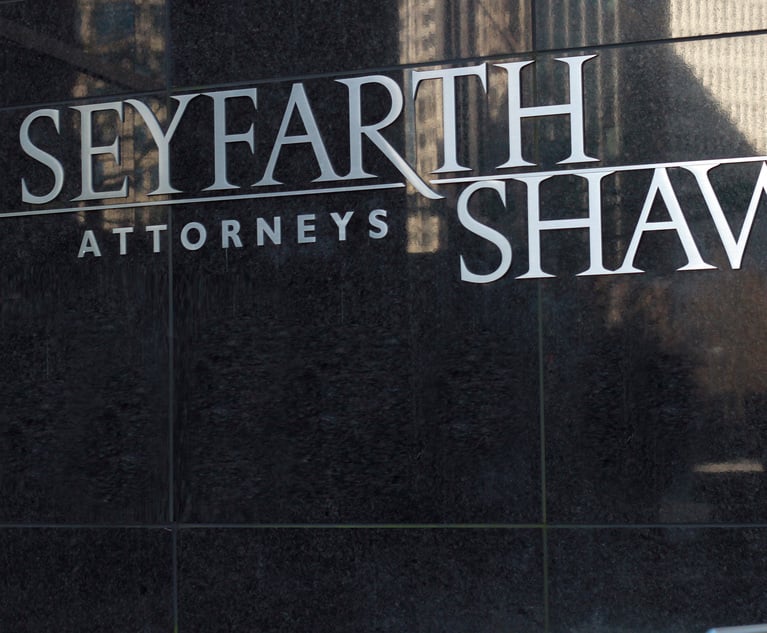Next Up at SXSW: Your Lawyer?
Among the attractions for lawyers at this year's South by Southwest conference are CLE panels on ethical lawyering in the entertainment business and "doing business with crooks."
March 13, 2018 at 04:55 PM
3 minute read

South by Southwest, the annual conference known as SXSW that's underway this week in Austin, Texas, bills itself as a celebration of “the convergence of the interactive, film, and music industries.”
But amid the startup hopefuls, the indie starlets and the rockers, there's plenty of room for lawyers. In addition to the usual networking opportunities, the conference is once again hosting Continuing Legal Education (CLE) sessions, and they're free for those who pay the SXSW admission of $1,250.
“If they didn't have excellent [CLE] programming, you be tempted to go to something else” at SXSW, said D'Lesli Davis, a partner at the Dallas office of Norton Rose Fulbright who will sit on a panel titled “Lawyers Gone Wild: Learning To Play by Ethical Rules.”
Nels Jacobson, aka Jagmo, organizes the CLE sessions. Before going to law school, Jacobson created rock posters for 30 years and also has promoted touring acts, including U2, REM, B.B. King, and King Sunny Adé. He also served as the original art director for SXSW.
Some of the scheduled CLE topics this year are obvious for lawyers serving the SXSW crowd: “Artist Legacy Planning & Protection” or “Big Legal Battles Over Rights in Bands' Names.” But there are some unusual offerings too, including “Cyber Extortion: Doing Business with Crooks,” which will feature an FBI agent and a Reed Smith associate from Houston.
Wallace B. Jefferson, the retired chief justice of the Supreme Court of Texas, who is now with Alexander Dubose Jefferson & Townsend in Austin, is scheduled to serve on the “Lawyers Gone Wild” panel along with Norton Rose Fulbright's Davis.
“The music industry poses many potential conflict situations and ethical concerns for the entertainment lawyer,” the listing for their panel states. “This panel of distinguished attorneys is out to prove that legal ethics is not an oxymoron.”
According to Davis, the panel will present three hypotheticals and raise questions about common ethical issues for lawyers in the entertainment industry, such as competency.
“Everyone wants to do this work, but how do you know if you have the competencies for it,” said Davis. Representing artists requires knowledge about copyrights, royalty streams and tax, among other things, and she said she and her fellow panelists will address “how much do you need to know?”
They will also cover contingency dealmaking, since lawyers in the entertainment business often represent clients who have little money and who want to get a deal done quickly and, therefore, may propose offering the lawyers a share of the profits.
Also frequently, one attorney is asked to represent both sides of a transaction, Davis said. “All of these raise ethical questions, which are made more difficult by the culture of the music business. They want to get things done fast, the easy way, not the hard way,” she said. But such scenarios can eventually be costly for lawyers when years later the only big pot of money available is their malpractice insurance policies, and plaintiffs pursue them, she said.
As for his part, former Justice Jefferson seems ready to rock. “I expect the panelists will have a lively debate and we hope to engage the audience with questions and comments,” he wrote in an email.
This content has been archived. It is available through our partners, LexisNexis® and Bloomberg Law.
To view this content, please continue to their sites.
Not a Lexis Subscriber?
Subscribe Now
Not a Bloomberg Law Subscriber?
Subscribe Now
NOT FOR REPRINT
© 2025 ALM Global, LLC, All Rights Reserved. Request academic re-use from www.copyright.com. All other uses, submit a request to [email protected]. For more information visit Asset & Logo Licensing.
You Might Like
View All

New Year Brings New Partner Hires for White & Case, Venable, Winston & Strawn
3 minute read
Baker McKenzie, Jones Day, Reed Smith Make 2025 Partner Promotions

Why Hogan Lovells and Perkins Coie Reversed, Will Now Pay Out Special Bonuses to Associates
4 minute readTrending Stories
- 1Crypto Groups Sue IRS Over Decentralized Finance Reporting Rule
- 2Jenner Brings Back Zachary Schauf from DOJ's Office of Legal Counsel
- 3'Erroneous Assumption'?: Apple Challenges DOJ Antitrust Remedy in Google Search Monopoly Case
- 4A Jury to Determine Whether Stairs Were Defectively Designed in Injury Case, State Appellate Court Rules
- 5Baker & Hostetler Names 24 New Partners
Who Got The Work
Michael G. Bongiorno, Andrew Scott Dulberg and Elizabeth E. Driscoll from Wilmer Cutler Pickering Hale and Dorr have stepped in to represent Symbotic Inc., an A.I.-enabled technology platform that focuses on increasing supply chain efficiency, and other defendants in a pending shareholder derivative lawsuit. The case, filed Oct. 2 in Massachusetts District Court by the Brown Law Firm on behalf of Stephen Austen, accuses certain officers and directors of misleading investors in regard to Symbotic's potential for margin growth by failing to disclose that the company was not equipped to timely deploy its systems or manage expenses through project delays. The case, assigned to U.S. District Judge Nathaniel M. Gorton, is 1:24-cv-12522, Austen v. Cohen et al.
Who Got The Work
Edmund Polubinski and Marie Killmond of Davis Polk & Wardwell have entered appearances for data platform software development company MongoDB and other defendants in a pending shareholder derivative lawsuit. The action, filed Oct. 7 in New York Southern District Court by the Brown Law Firm, accuses the company's directors and/or officers of falsely expressing confidence in the company’s restructuring of its sales incentive plan and downplaying the severity of decreases in its upfront commitments. The case is 1:24-cv-07594, Roy v. Ittycheria et al.
Who Got The Work
Amy O. Bruchs and Kurt F. Ellison of Michael Best & Friedrich have entered appearances for Epic Systems Corp. in a pending employment discrimination lawsuit. The suit was filed Sept. 7 in Wisconsin Western District Court by Levine Eisberner LLC and Siri & Glimstad on behalf of a project manager who claims that he was wrongfully terminated after applying for a religious exemption to the defendant's COVID-19 vaccine mandate. The case, assigned to U.S. Magistrate Judge Anita Marie Boor, is 3:24-cv-00630, Secker, Nathan v. Epic Systems Corporation.
Who Got The Work
David X. Sullivan, Thomas J. Finn and Gregory A. Hall from McCarter & English have entered appearances for Sunrun Installation Services in a pending civil rights lawsuit. The complaint was filed Sept. 4 in Connecticut District Court by attorney Robert M. Berke on behalf of former employee George Edward Steins, who was arrested and charged with employing an unregistered home improvement salesperson. The complaint alleges that had Sunrun informed the Connecticut Department of Consumer Protection that the plaintiff's employment had ended in 2017 and that he no longer held Sunrun's home improvement contractor license, he would not have been hit with charges, which were dismissed in May 2024. The case, assigned to U.S. District Judge Jeffrey A. Meyer, is 3:24-cv-01423, Steins v. Sunrun, Inc. et al.
Who Got The Work
Greenberg Traurig shareholder Joshua L. Raskin has entered an appearance for boohoo.com UK Ltd. in a pending patent infringement lawsuit. The suit, filed Sept. 3 in Texas Eastern District Court by Rozier Hardt McDonough on behalf of Alto Dynamics, asserts five patents related to an online shopping platform. The case, assigned to U.S. District Judge Rodney Gilstrap, is 2:24-cv-00719, Alto Dynamics, LLC v. boohoo.com UK Limited.
Featured Firms
Law Offices of Gary Martin Hays & Associates, P.C.
(470) 294-1674
Law Offices of Mark E. Salomone
(857) 444-6468
Smith & Hassler
(713) 739-1250








